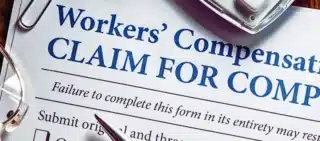
Common Reasons an Employer Won't Report Your Work Injury A total of 101,400 non-fatal work-related injuries and illnesses occurred in...


Surviving dependents might wonder what happens if a worker dies on the job. Under the Workers’ Compensation Act, eligible surviving dependents of an employee who dies on the job are eligible to pursue death benefits to help make up the income lost when the worker passed away, as well as funeral and burial expenses.
Submitting a completed application for adjustment of claim form to the Illinois Workers’ Compensation Commission (IWCC) marks the beginning of the process of obtaining death benefits. You can get this form from the IWCC’s website or offices. You must file this form within three years from when your loved one died or two years from the last benefit received, whichever comes later.
Our workers’ compensation lawyers can answer your questions, address your concerns, and guide you through the claims process to ensure you receive maximum compensation.

The Workers’ Compensation Act in Illinois offers benefits to injured workers or families of workers killed on the job. An injured worker or surviving beneficiary of a deceased worker can submit a claim to the IWCC, an agency that handles all workers’ compensation claims in the state.
Workers’ comp is a no-fault insurance system. As such, eligible surviving dependents can still obtain death benefits even if the deceased worker was partially liable for the fatal workplace accident. Similarly, eligible dependents cannot bring a wrongful death lawsuit against the employer, even if the employer was to blame for the deadly accident or incident.
A workers’ comp lawyer at our law firm in Peoria can walk you through Illinois worker’s compensation laws, determine your eligibility, and help you pursue fair compensation.
The deceased worker’s family is entitled to workers’ compensation benefits known as death benefits. The deceased worker must have been doing work-related duties before falling victim to a fatal accident or illness for the eligible family members to receive benefits.
Death benefits are usually two-thirds of the gross weekly wage or earnings the worker made before death. Certain caps apply to these benefits, however. These caps are determined using the income the worker earned 52 weeks before his or her death.
The caps change periodically, as they are subjected to cost of living adjustments every six months.
Eligible surviving dependents will collect death benefits of up to $500,000 or for up to 25 years, whichever is greater. The dependent(s) will receive these benefits every month, even though Illinois calculates them per week.
Death benefits also cover up to $8,000 in funeral and burial expenses.
Death benefits enable surviving family members to cover their everyday expenses and the losses arising from the death. For this reason, only eligible family members can receive these benefits.
The deceased worker’s surviving spouse and minor children are the first in line to collect death benefits. They are known as primary beneficiaries. In the absence of a surviving spouse or children, the next in line to receive the benefits is the worker’s parents. There is a caveat, however. The parents must have been fully reliant on the deceased worker for financial support.
Another party may qualify to obtain death benefits if there is no surviving spouse, minor children, or completely dependent parents. That party must, however, prove that he or she was 50% or more dependent on the worker.
Except under certain unique circumstances, Illinois workers’ comp laws prohibit surviving dependents of workers killed in a fatal workplace accident from bringing a civil wrongful death claim against the employer. Instead, they require employers to carry workers’ comp insurance.
This insurance provides benefits to the surviving dependents, regardless of who caused the accident. Employers carry the responsibility of covering expenses and losses related to the worker’s death, even if they did not directly contribute to the accident.
Grounds for suing an employer may exist if the employer intentionally inflicted fatal injuries on the worker or did not have workers’ comp insurance. They may also exist if the employer did not take reasonable corrective actions despite knowing that dangerous conditions existed in the workplace.
Note that the employer’s actions must have been grossly negligent for you to have a legal basis for a civil lawsuit. Causing a worker’s death by intentionally and/or repeatedly violating OSHA regulations might be an example of gross negligence.
OSHA regulations require employers to offer their employees a safe and healthy workplace. Generally, employers must comply with the following OSHA regulations:
Employers must ensure the workplace is safe and secure for employees. They can do that by embracing practices that identify and correct a hazardous condition at its source. A perfect example of such a practice is engineering control. This type of control modifies the work setting and the job to remove hazardous conditions or minimize exposure to those conditions.
Engineering controls sometimes cannot remove all hazardous conditions from the workplace. Similarly, administrative controls may fail to offer adequate protection, especially for jobs with the most workplace accidents. OSHA requires employers to invest in the right PPE in such situations. They should also develop and implement a PPE program.
The program should outline the criteria for choosing, maintaining, and using PPE. It should also constitute comprehensive training requirements for employees wearing or using PPE.
OSHA rules require employers to ensure workers know the safety and health hazards associated with their jobs and how to address them. Regular training is necessary to meet this requirement. They also require employers to assign specific job duties to workers with the relevant qualifications or certifications. According to OSHA, training is instrumental in minimizing workplace injuries and illnesses.
Employers must keep records of job-related injuries, illnesses, and death. They must create a reporting system, submit copies of logs when requested, and report any accident that lead to a death or hospitalization of at least 3 workers within 8 hours.
Record keeping enables OSHA to collect valuable data, determine high-hazard sectors, and inform workers of hazards present in their workplaces. Keeping records is, however, optional for low-hazard sectors like retail, finance, and real estate.
OSHA standards may require employers to have medical exams performed on you if your job involves handling chemicals or other dangerous substances. Regular medical exams may also be necessary for professions at the highest risk for workplace cancer. Your employer must provide you with copies of your exposure or medical records upon request.
The OSHA Act bars your employer from discriminating or taking any punitive measures against you for exercising rights entitled to you under the Act. Discrimination can range from getting fired, laid off, or demoted to getting denied promotion or overtime.
Report any incident of discrimination against you for exercising your rights to your local OSHA office. You have 30 days from when the incident happened to make this report.
Workers’ comp laws do not protect individuals or companies besides the employer who may have contributed to the fatal accident.
Under the Illinois Wrongful Death Act, the deceased worker’s personal representative can bring a civil suit against third parties liable for a workplace accident that killed the worker. The burden of proof in such cases lies with personal representatives.
The representative must present strong and compelling evidence to show all four elements of a wrongful death suit. These elements include:
A third-party wrongful death claim can be filed against a manufacturer whose defective machinery killed a worker on the job. A third-party driver who was partially or fully liable for a fatal car accident that left a worker on the job dead may also face a wrongful death claim.
Claiming death benefits through either a workers’ comp claim or a wrongful death lawsuit has strict filing deadlines. In Illinois, the deadline for starting a workers’ comp claim for death benefits is three years from when the worker died or received the last disability benefits. The deadline for a third-party wrongful death suit is two years from the date of death. A workers’ compensation lawyer can determine specific statutes applicable to your situation, file a claim on your behalf, and ensure your rights are protected throughout the process.

Common Reasons an Employer Won't Report Your Work Injury A total of 101,400 non-fatal work-related injuries and illnesses occurred in...

At Strong Law Offices, we have a team of workers' compensation lawyers who understand the financial setbacks and physical limitations...

Common Equipment Involved in Run-Over Accidents Illinois job sites, from construction zones to industrial plants, depend on machinery to stay...